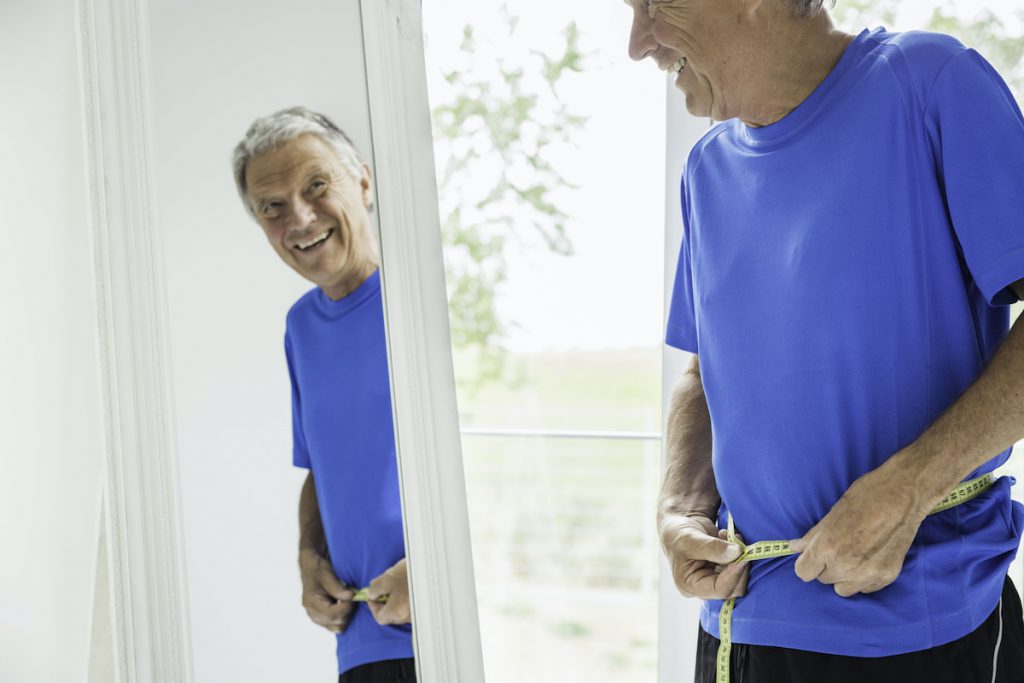Weight Loss Basics for Older Adults: The SilverSneakers Guide
It’s easier to gain weight and harder to lose as you get older. But that doesn’t mean you can’t make meaningful changes.

Getting older comes with plenty of physical and mental changes. For many people, one of those shifts tends to be some weight gain.
Now for the good news: It’s totally possible to shed pounds. You just might need to tweak your approach. That’s because the weight-loss strategies that work for younger adults don’t always translate after age 65.
Here’s your guide for why weight matters, some sneaky contributors to weight gain that might surprise you, plus healthy strategies that make a difference.
Get and stay fit with SilverSneakers! Choose from dozens of different Community classes, visit a participating fitness location, or view the current schedule of SilverSneakers LIVE online classes.
What are the biggest causes of weight gain for older adults?
There are several reasons you may gain weight as you get older.
The biggest is a shift in your basal metabolic rate. That’s how your body uses energy, both when you’re active and at rest. At around age 60, this rate naturally declines. Even if you’re eating the same number of calories, your body is burning them at a slower rate. Those excess calories get stored as fat. And it means you have to work even harder to work them off.
Another factor is decreased muscle mass. It’s a natural change that can work against your waistline, as muscle burns more calories than fat.
Hormones during menopause can also play a role in weight gain. The challenge here is that this transition tends to cause a redistribution of fat. You’re more likely to see gains in the belly and hips during this time.
Being overweight can cause you to be less active. This is especially true if mobility is an issue. A sedentary lifestyle can worsen your weight problem.
Fad diets can help you drop pounds quickly. But research shows that with extreme calorie restriction or other dramatic eating changes, it’s likely you’ll gain the weight back. You might even gain back more than you started with. (Does the phrase yo-yo dieting sound familiar? Read how to stop it here.)
What are some surprising causes of weight gain for older adults?
There are some sneaky contributors to weight gain you might not think about. Addressing these issues could nudge you toward weight loss, especially if you’ve hit a plateau.
These include:
- Insomnia or disrupted sleep
- Stress and anxiety
- Certain medications, including those used for diabetes, depression, and heart disease
- Thyroid issues
- Difficulty absorbing protein
- Micronutrient deficiencies
Research published in the journals PLoS One and the Journals of Gerontology suggests that grief and loss can make it harder to shed pounds, too. This could be the death of a loved one. But it could even be something like retiring. If you’re feeling stressed about any life change, you could become more prone to emotional eating.
Why is weight gain an issue when you’re older?
While carrying a bit of extra weight is likely fine, the Centers for Disease Control and Prevention reports that being overweight or obese comes with health risks such as:
- Joint pain and osteoarthritis
- Sleep disruption, especially sleep apnea
- Heart health issues, including stroke and heart disease
- High blood pressure
- Diabetes
- Kidney disease
Being overweight has also been associated with some cancers, including breast, endometrial, colon, gallbladder, and kidney cancers, the CDC also reports. It can affect your mental and brain health, too. Pursuing a weight-loss strategy that’s gradual and realistic can be a boon for your overall wellbeing.
Belly fat, in particular, is especially dangerous when it comes to heart health. According to the American Heart Association, even people who are at a healthy weight have a higher risk of heart disease if they carry most of their fat in their abdomen. This indicates a higher amount of visceral fat, the type that wraps around vital organs.
What are some dietary steps that help with weight loss?
It may seem easy to simply eat less food to lose weight. But older adults are at risk for malnutrition. It’s safer to focus on eating more nutritious foods instead of cutting back on how much you’re eating, advises Loretta DiPietro, Ph.D., M.P.H., professor of exercise and nutrition sciences at George Washington University’s Milken Institute of Public Health.
Because older adults are more likely to have issues with absorbing protein, it’s important to eat more of this macronutrient daily. Try to space out your protein into three meals instead of just loading up during one meal.
According to the National Academy of Medicine, adults in their 50s and older should eat 0.8 grams per kilogram of body weight in protein, or about 0.36 grams per pound. For example, a 200-pound person should eat 72 grams of protein daily. But some research suggests this amount should be much higher for older people.
Getting 25 to 35 grams of protein at every meal will help keep your muscles fueled with the protein they need, which will boost your calorie burning potential.
Here’s what 25 grams of protein looks like:
- 3 ounces of roast turkey or chicken
- 3 ounces of skinless chicken breast
- 4.2 ounces of salmon
- 2/3 can of tuna
- 2 cups low-fat yogurt or 1.5 cups Greek yogurt
- 1 cup cottage cheese
- 4 string cheese sticks
- 2 cups black beans
- 3 ounces pork chop
- 1.5 cups edamame
Another helpful addition is to make sure you’re eating plenty of fruits and vegetables. Not only are these packed with key vitamins and antioxidants, but they also contain fiber. Fiber has been shown to play a major role in weight management.
Finally, try to limit or avoid highly processed foods, which are often lacking in nutrients and can make it easier to store excess calories as fat, says DiPietro.
How does exercise help you lose weight?
Findings from the National Weight Control Registry show that physical activity is a key to successful weight loss. The registry was created in 1993 to identify the characteristics of individuals who have been successful at keeping weight off.
In fact, to lose weight and stay fit for the long haul, the National Institute on Aging encourages a well-rounded routine that includes four different types of exercise:
- Aerobic or cardio (also known as endurance exercise)
- Flexibility
- Strength or resistance exercises
- Balance training
Strength training is especially important to reach and maintain a healthy weight as you get older. That’s because muscle mass fuels your metabolism so that your body burns more calories, explains registered dietitian Lyssie Lakatos, R.D.N., who is also a certified personal trainer.
Trying out a few different SilverSneakers classes is one good way to cover all four of these bases. There are more than 20 classes that are good for all fitness levels — from the beginner-friendly SilverSneakers Classic and SilverSneakers Yoga to the more intermediate SilverSneakers Circuit, Total Body Strength, or Yoga Pilates Fusion.
Classes are offered both in-person and online with SilverSneakers LIVE. Remember to discuss any new exercise program with your doctor.
If you need extra help, consider booking an assessment or tutorial with a certified fitness professional. An expert can get you on the fast track to weight loss and explain how to do it safely.
What other strategies can help you lose weight?
Although changing what you eat is the top way to manage your weight, there are also other lifestyle habits that make a big difference.
Subscribe to our newsletter
It's quick and easy. You could be one of the 13 million people who are eligible.
Already a member? Click to discover our 15,000+ participating locations.
Follow Us
One of the biggest and most important changes? Get in the right mindset. Losing weight isn’t easy, especially when you get older, so it’s helpful to see this as a positive change rather than a battle against the bulge, DiPietro says.
Try these lifestyle changes, too:
- Maintain social connections
- Write down your reasons for wanting to lose weight
- Set specific goals that are related to activities rather than scale weight; for example, walking a certain distance or doing a specific number of SilverSneakers classes per week
- Choose activities you love to do, like yoga or swimming
- Manage chronic conditions, especially those with a weight component such as diabetes or thyroid issues
- Find ways to de-stress every day
- Set a relaxing bedtime routine, and make sure you’re getting enough quality sleep
When should I talk to my doctor about weight loss?
Keep in mind that meaningful weight loss — the kind you can maintain — takes time, often longer than you might want. Losing about one to two pounds a week is usually considered a good pace, but you may lose less at the beginning of your weight loss journey.
If you’ve been making changes for a few months and still not seeing any progress, it might be helpful to talk with your doctor. They can teach you other strategies that can be useful.
For example, you may be on medication that has weight gain as a side effect. Switching your prescription could solve that issue. You might also have struggles with physical activity due to mobility limitations. Addressing that with a physical therapist could make a difference.
There are some weight-loss medications, as well as bariatric surgery options. You may want to talk with your health provider about whether those choices are something to pursue. But often, surgery is considered well after other strategies have been tried.
Start with tweaking your diet, activity level, stress, and sleep. It’s likely you’ll notice a gradual shift not just in your pants size, but also in your health and mood.
Recommended reading:
Lose the Weight, Keep (Even Gain!) the Muscle: Your 3-Step Plan
7 Common Weight Loss Mistakes People Over 60 Make
How to Start Exercising When You Have 25+ Pounds to Lose
Sources:
Metabolic rate: Science (2021). Daily expenditure through the human life course
Older women: Mayo Clinic Proceedings (2017). Weight Gain in Women at Midlife
Weight regain: American Psychological Association (2018). Why do dieters regain weight?
Sleep: National Institutes of Health (2016). Molecular ties between lack of sleep and weight gain
Bereavement: PLoS One (2014). The Influence of Bereavement on Body Mass Index: Results from a National Swedish Survey
Retirement: Journals of Gerontology (2008). Retirement and Weight Changes Among Men and Women
Cancer: Centers for Disease Control and Prevention (2021). Obesity and Cancer
Heart health: American Heart Association (2021). Too much belly fat
Take Your Favorite SilverSneakers Classes Online!
SilverSneakers members can access live fitness classes and wellness workshops through SilverSneakers LIVE. See the latest schedule and RSVP for classes here.
Not a member? If you have a Medicare Plan, it may include SilverSneakers — at no additional cost. Check your eligibility instantly here.
Not eligible for SilverSneakers? You can still get 200+ free SilverSneakers On-Demand videos and stay in touch with us by creating your online account.




